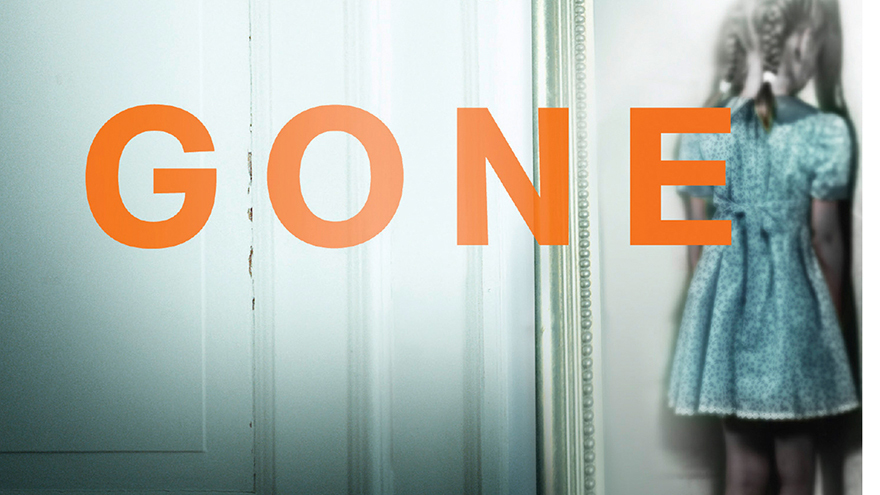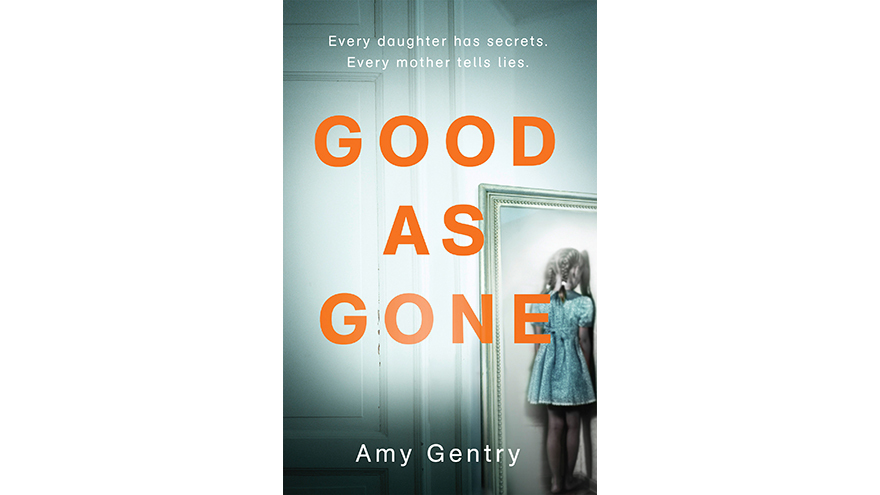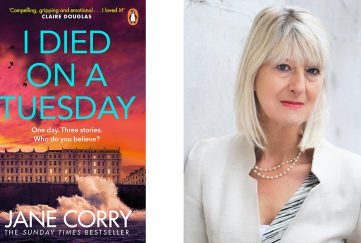Chilling Family Noir Good As Gone – Review and Exclusive Extract

Good As Gone by Amy Gentry (HQ PB, £7.99, eBook £7.99, Audio Edition £12.99)
Reviewed by Karen Byrom
Eight years ago, thirteen-year-old Julie Whitaker was abducted at knife-point from her bedroom in the middle of the night. The only witness was her sister Jane, hiding, terrified and unable to save her beloved sister.
In the years that follow, the family paper over the cracks of their grief, while holding on to the hope that Julie is out there somewhere, alive and well.
But inside they all change – especially Jane. As she grows older she clings to her father, Tom, but rejects her mother, Anna, going off to college several states away from where Anna teaches.
Then, miraculously, Julie returns, claiming that her abductor abused her then sold her on to a string of men, until she ended up locked in a compound somewhere in Mexico. She has escaped and made her way home.
Heartbreaking and shocking
Tom is ecstatic at the return of his daughter, Jane welcomes her sister with open arms. Only Anna is hesitant. She so wants to believe that the girl who has returned is Julie. But there are holes in her story, discrepancies in her memories, and Anna is anxious enough to set a private detective on the case to uncover the secrets of Julie’s return…
Well -paced and thrilling, Good As Gone is told from both Anna and Julie’s viewpoints so that the reader is always just one step ahead and on tenterhooks to know what comes next. The denouement when it comes is as heartbreaking as it is shocking, but ultimately satisfying as all secrets are revealed and the family can at last properly move on.
Amy Gentry tackles the tough subjects of grooming and sexual abuse in this book, but ultimately Good As Gone is about family relationships and how they survive unimaginable trauma. The result is a sometimes disturbing but always enthralling story that is believable and true to its plot and characters.
Read on for an extract from Good As Gone, where Jane is returning from college for the holidays after a few months’ absence, just before her sister returns from 13 long years away …
Wake up, wake up, wake up, Jane told herself, but nothing happened.
Everything was frozen, including her, like in a dream; only Julie and the man kept moving. Slow, but faster than frozen; slow, but they were almost to her room. Janie opened her mouth to scream.
Then Julie saw her.
Jane’s scream slid back down into her stomach as Julie stared straight into her closet hiding place. Jane stared back, begging Julie to tell her what to do next, readying herself to obey, to yell or cry or maybe even laugh if it was all a joke. Surely Julie wouldn’t leave her alone in this bad dream. If Julie would just tell her what to do, Jane promised silently, she would listen to her and never complain from now on.
Without moving her head, Julie lifted her eyebrows and glanced meaningfully toward the man behind her, then back to Jane, as if telling her to take a good look, but Jane didn’t want to; she kept her eyes trained on Julie instead. Girl and man turned on the landing without pausing at her door, and Jane saw why Julie was walking so stiffly: the man held the tip of a long, sharp knife to her back. Jane felt a nasty sting like a bug bite between her own shoulder blades, and her eyes filled up with tears.
They were poised at the top of the stairs when a loud tick sounded from the attic. Jane knew it was only the house settling, but the man stopped and looked over his shoulder nervously. In the split second before he looked back, Julie, as if freed from a spell, turned her head to Jane, raised her left index finger to her lips, and formed them into a silent O.
Shhh.
Jane obeyed. Julie started down the stairs, followed by the man with the knife.
And that, according to the only witness, is the story of how I lost my daughter — both my daughters, everything, everything — in a single night.
13 Years Later
It’s tricky picking Jane out of a crowd these days. You never know what color her hair is going to be. I stand close to baggage carousel 9 and wait until a tall girl with burgundy-black hair emerges from the crowd of passengers, a lock of faded-out green dangling in front of her eyes, having survived yet another dye job intact.
“Hi, Mom,” she says.
“Hi, Jane.” We hug, her heavy satchel thwacking my hip as she leans over, and then the empty baggage carousel utters a shuddering shriek and we both turn to look at it while I decide how best not to ask about her unexpected arrival.
“You changed your hair again,” I observe.
“Yep.”
Everything Jane says and does is a variation on the slammed door that first became her calling card in middle school, a couple of years after Julie was taken. In high school, Jane added loud music, hair dye, and random piercings to her repertoire, but the slammed door remained the centerpiece of the performance. Tom used to follow her dutifully up the stairs, where he weathered the sobs and yells I heard only in muffled form. I figured she needed her privacy.
“Did you have a good flight?”
“It was okay.”
We’ll miss you of course
It was long. I suspect Jane chose the University of Washington because of its distance from Houston. When she was a little girl she used to say she wanted to go to the university where I teach, but the pennants came down around the same time the door slamming began. She might have ended up in Alaska if she hadn’t insisted on going to a school that had quarters instead of semesters — every possible difference a crucial one. All typical teenage behavior, no doubt, but with Jane, it made a particular kind of perverse sense — as does the fact that, according to the registrar, she took incompletes in all her spring-quarter classes.
This after she’d stayed in Seattle through the entire school year. I didn’t think much about her not coming home for Thanksgiving; it’s commonly skipped by students on the quarter system, since the fall quarter starts so late. But when she explained to us over the phone in mid-December that she was just settling in, that one of her professors had invited her to a holiday dinner, that our family never really celebrated Christmas anyway, did we?, and that she felt like it would be good for her sense of independence to stay, I could practically hear Tom’s heart breaking over the extension.
I covered for his silence by saying the sensible thing, the only possible thing, really: “We’ll miss you, of course, but we understand.”
Now it seems the whole holiday situation was yet another slammed door to which I’d failed to respond properly.
We’re just glad you’re home
“So,” I say, starting again. “You still enjoying U-Dub?”
“Go Huskies,” she says with a limp fist-pump. “Yeah, Mom.
Nothing’s really changed since last time we talked.” The bags start dropping onto the conveyor belt, and we both lean forward.
“Was that coat warm enough for January up there? Winter stuff is on clearance, we could go shopping.”
She picks self-consciously at the army jacket she’s worn since she was sixteen. “This is fine. I told you guys, it doesn’t get that cold.”
“Classes going okay?”
“Yeah,” she says. “Why?”
“Just making small talk.”
“Well, they’re going really well,” she says. “Actually, they’re going so well, my professors are letting me turn in papers in lieu of exams.”
In lieu of exams! That sounds official. I wonder how she got them to agree to give her incompletes rather than failing her. My students usually just say “Family emergency” and hope I don’t press them for details.
Carefully, I ask, “Is that something they do a lot at U-Dub?”
“Mom,” she says. “Just say ‘University of Washington.’ ”
I give her shoulder a quick squeeze. “We’re just glad you’re home.” I lower my arm and we stand there, side by side, staring at the shiny metal chute, until half the passengers on the flight have claimed their bags and wheeled them off, their absence making the juddering of the conveyor belt sound even louder. Finally, Jane’s rolling suitcase somersaults down the chute and thunks onto the belt in front of us. It was a graduation present — apple green and already dingy from its maiden voyage to Seattle and back, it almost matches her dyed-green streak. She grabs the suitcase before I can make a move but lets me take her satchel when she stops to peel off her army jacket in the blast of humid air that hits us outside the automatic sliding doors.
“I see we’re in swamp mode already.”
“No place like home,” I reply and am rewarded with a half smile of acknowledgment.
I feel a glow of pride
The ride home is rocky, though. I’m shooting blanks on college life despite spending most of my time in a university.
“How are the dorms?”
“Pretty good.”
“You still like your roommate?”
“She’s fine. We stay out of each other’s way.”
“Are you going to room with her next year?”
“Probably not.”
Finally I resort to a subject I’m sure will get results, although it pains me. “So, tell me about this English professor you ate Christmas dinner with.”
“Her name is Caitlyn, and actually she’s a professor of semiotics.”
Caitlyn. “I didn’t know they still taught semiotics in English departments.”
“The course is called Intersectionalities. It’s an English class, but it’s cross-listed with linguistics, gender studies, and anthro.
There are supposed to be all these prerequisites, but I went to Caitlyn’s office hours on the first day and convinced her to let me in.”
I can’t help but feel a glow of pride. A true professor’s kid, Jane knows all the angles. Moreover, this is the longest string of consecutive words she’s spoken to me without Tom around for ages.
“Tell me more about it, what did you read?”
“I think I’d rather wait and talk about it with Dad too,” she says.
“Of course,” I say.
“I don’t want to say it all twice.”
“Sure, sweetie.”
Jane throws her arms around Tom
I turn on NPR, and the measured, comforting sound of rushhour news commentary fills the car as we inch past a firing range and a gym where an Olympian gymnastics coach is probably even now yelling at ponytailed girls in formation. Jane stares out her window. I assume she is wondering why Tom didn’t come to pick her up instead of me. I’m wondering too.
A few minutes later we both find out. Pulling into the driveway, the sky just starting to glow with dusk, I spot Tom through the kitchen window, making dinner. As I open the door and walk in, I smell Jane’s favorite pasta dish: fettuccine Alfredo tossed with breaded shrimp and grilled asparagus, a ridiculously decadent recipe Tom got off the Food Network and makes only on special occasions. An expiatory salad of fresh greens is in a bowl next to the cutting board, ready to join the bright Fiestaware on the dining-room table.
“Janie!” Tom opens his arms and steps forward, and Jane throws her arms around him, squeezing her eyes shut against his chest.
The doorbell rings …
I slip off to the bathroom, then to the bedroom to change out of my teaching outfit into more comfortable jeans, loitering for a few minutes to put away some laundry that’s been sitting, folded, in a basket at the foot of the bed. When I return, they are talking animatedly, Tom’s back to me as he chops heirloom tomatoes for the salad, Jane resting the tips of her fingers on the butcher block as if playing a piano.
“Dad, you would not believe the names people were throwing around in this class,” she says. “Derrida, stuff like that. Everyone was so much smarter than me.”
“Hey, she let you in, and she’s the MacArthur Genius lady.”
“Every time I opened my mouth I sounded like an idiot.”
“At least you opened your mouth,” he says, resting the knife to the side of the cutting board for a moment while he looks her in the eye. “I bet there were some people who were too scared to talk.”
Jane’s grateful smile, just visible over Tom’s shoulder, curdles me like milk. As if he can sense it, Tom turns around and sees me standing there. He throws a handful of chopped tomatoes onto the pile of greens and picks up the salad bowl.
“Everything’s ready!” he says. “Grab the pasta, Jane. Let’s sit down and eat our first family dinner in God knows how long.”
And that, believe it or not, is when the doorbell rings.
Good as Gone by Amy Gentry is out 6th April (HQ, £7.99)





